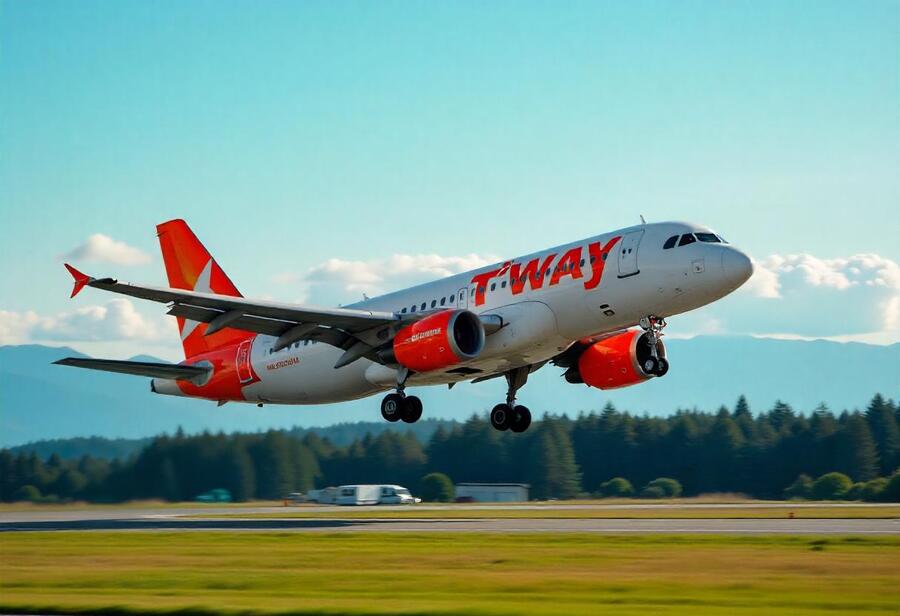Monday, July 14, 2025
In historic expansion, South Korea made a significant step in enhancing its international aviation profile as T’way Air embarked on its historic direct Vancouver International Airport service. The development not only witnessed the airline set foot in North America for the first time, but also marked an important new Seoul-West Canada link. With the itinerary representing all-year-round, four-times-weekly services, the air link delivers revolutionary connectivity for both cargo and people, as well as building significant British Columbian economic momentum in terms of increased intra-regional trade, travel, and jobs.
Vancouver International Airport (YVR) hit a new high in North American aviation as the initial airport on the continent to receive scheduled passenger service from South Korea’s low-cost carrier, T’way Air. The new service, introduced officially on July 12, provides four nonstop weekly services connecting Vancouver and Seoul’s Incheon International Airport (ICN), and marks an important year-round air bridge between the regions.
This historic project further bolsters Vancouver’s growing position as a significant transpacific travel and commerce gateway for Canada while granting Canadians increased access to the region’s dynamic markets and attractions in East Asia.
North America’s First and South Korea–Canada’s Great Leap Forward for Connectivity
The inauguration marks T’way Air’s initial foray on the North American continent, extending its global expansion beyond Asia and Europe. Choosing Vancouver as its initial destination in Canada, the airline observes the port-city’s significant position in people movements as well as cargo distribution.
The new service presents travelers with an affordable and convenient way to enter South Korea and connect further into Asia. The inaugural departure for Vancouver International Airport is at 5:25 p.m. local time, and the plane lands in Seoul the next day at 9:35 p.m. local time. The plane is operated using an Airbus A330-300, which can hold 347 people, comprising lie-flat business-class seats made for long long-haul comfort. With a capacity for near 2,700 people each week, the connection will quickly become very popular for vacation tourists, working professionals, and visiting families in no time.
Economic Impact and Cargo Increase for British Columbia
Apart from tourism, the new service brings significant economic value for British Columbia. The new service is expected to contribute a total value of $39.8 million in economic activity. The new service will contribute an added value of $20.8 million in provincial GDP, in addition to stimulating the creation of approximately 237 existing jobs in various sectors such as aviation, hospitality, logistics, as well as in tourism enterprises.
The new link fortifies Vancouver’s existing strong trading ties with South Korea—the airport’s current second-largest air cargo export market centered in YVR. The airport contained a record 339,000 cargo tonnes in 2024, and T’way’s wide-body aircraft will introduce greatly valued belly-hold capacity on high-value cargo such as electronics, pharmaceuticals, seafood, and clean tech.
The increased freight capacity is particularly important as supply chain demands shift and as exporters require faster, more direct access to the Asian markets.
A Cultural and Community Partnership Model
As part of marking the historic flight, on the airport, a special ceremony was held, consisting of cultural blessings and performances, which marked the airport’s commitment to community partnership. The event represented an ongoing relationship between Indigenous people and the airport, which promoted a long-term policy on sustainability and reconciliation in pursuit of mutual growth and inclusion.
The agreement is an exemplary instance of promoting contemporary infrastructure development to respect customary relationships as well as promote economic growth and protection for the environment.
T’way’s Global Ambitions Come to Life
T’way Air was established in 2010 and grew step-by-step to be one of the biggest low-cost airlines in South Korea, expanding abroad. The carrier operates over 40 routes, which symbolize cities in Southeast Asia, Japan, Australia, and European cities.
Vancouver is the biggest move made to-date by the airline. As global demand for travel rebounds, T’way is looking to capture a slice of the long-haul market in the form of on-time, competitively-priced transpacific service with increased comfort configurations. Its Airbus A330-300s are ideally suited to medium- to long-haul markets, balancing cost-effectiveness for the airline against customer amenity requirements—a key selling proposition for price-sensitive but comfort-driven travelers.
The expansion to Canada is also a move in a broader plan for T’way to establish bases in economically influential regions with high Korean expat populations and high commerce volumes.
A New Era in Transpacific Travel
T’way Air’s entry to YVR is not just a new air route, but an indication of growing Canada-South Korea relations. It is an expression of the growing importance of Asia-Pacific relationships and the evolution of international air travel.
This new service provides travelers additional choice, brings new increased competition in the transpacific market, and brings new vitality in Canada’s air marketplace. For Vancouver, it’s another in a long line in making Vancouver a world class Pacific gateway, offering global travelers a modern, culturally diverse, and economically strategic center for international air travel.
With T’way Air in the skies over the Pacific, YVR continues to be among the most internationally connected and forward-thinking airports in North America.
